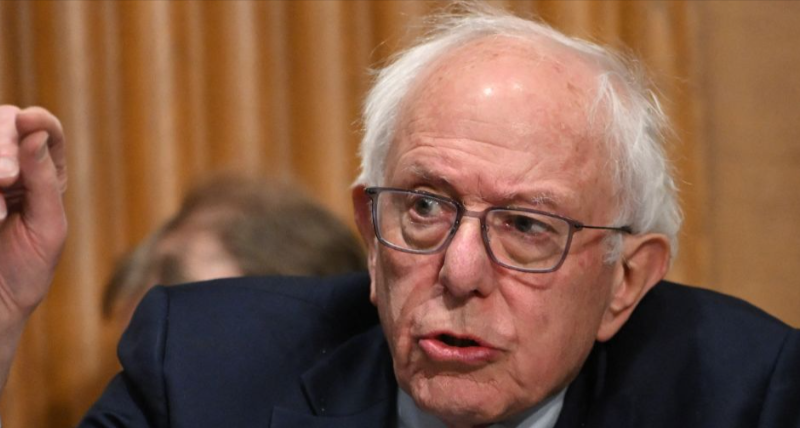Bernie Sanders Gets Agitated When Treasury Nominee Scott Bessent Dismantles His 'Oligarchs' Question

When President Joe Biden and Senator Bernie Sanders criticize “oligarchs” in the tech industry, it becomes evident that they’re only referring to individuals they dislike rather than addressing the concept of oligarchy in its entirety.
This distinction became apparent during a tense exchange involving President-elect Donald Trump’s nominee for Treasury secretary.
In case you happened to miss Biden’s farewell address to the nation—and it would be understandable if you found yourself preoccupied with more engaging activities, such as enduring a nighttime root canal—Biden stirred controversy by declaring, “an oligarchy is taking shape in America of extreme wealth, power and influence that literally threatens our entire democracy, our basic rights and freedoms and a fair shot for everyone to get ahead.”
“We see the consequences all across America. And we’ve seen it before,” Biden remarked, according to the White House transcript of his speech.
Your interpretation of oligarchy may vary. Transitioning to what Biden labeled a “tech-industrial complex” (at least he acknowledged borrowing the term from Dwight Eisenhower, a departure from his earlier controversies involving Neil Kinnock and others), he included social media platforms that are “giving up on fact-checking.”
This conveniently sidesteps how his administration has often pressed these platforms to adopt their narrative by pressuring companies like Meta. For Democrats, it appears that without government intervention, such dynamics are simply unacceptable.
But I digress. The day after Biden’s address, Senator Sanders, a self-identified democratic socialist from Vermont, seized upon the “oligarchy” rhetoric as a pretext to confront Treasury secretary nominee Scott Bessent, a hedge fund manager, during a Senate Finance Committee hearing.
Sanders, referencing Biden’s comments, asserted, “I agree with” the president and proceeded to name several individuals he deemed “oligarchs,” including Jeff Bezos, Elon Musk, Rupert Murdoch, and Mark Zuckerberg.
“Do you?” he asked Bessent.
Bessent responded by noting that the individuals Sanders named—whose inclusion in the list seemed to reflect partisan undertones—“all made the money themselves” and that “Mr. Musk came to the country as an immigrant,” a detail worth highlighting.
Sanders then clarified that he wasn’t concerned about how they acquired their wealth—an interesting omission given its relevance to the definition of an oligarch—but rather their possession of wealth itself.
“What Biden said last night is, ‘we’re moving toward an oligarchy.’ I’m asking you that question,” Sanders pressed. “Do you think—forget how they made their money—do you think that when so few people have so much wealth and so much economic and political power, that that is an oligarchic form of society?”
Bessent wryly pointed out the selective nature of such critiques, suggesting that the left only labels those on the opposing side as oligarchs.
“Well, I would note that President Biden gave the Presidential Medal of Freedom to two people who I think would qualify for his oligarchs,” Bessent remarked, referring to Democratic donors and activists George Soros and David Rubenstein, who received the award near the end of Biden’s tenure.
.@SenSanders: "What Biden said last night is we're moving towards an oligarchy. I'm asking you that question...forget how they made that money."
— CSPAN (@cspan) January 16, 2025
Scott Bessent: "President Biden gave the presidential medal of freedom to two people who I think would qualify as his oligarchs." pic.twitter.com/cAu3tXb4YS
Sanders, clearly dissatisfied, claimed his remarks were “not a condemnation of any one individual” (despite naming three) and reiterated his broader concern with an “oligarchic form of society.”
If Sanders genuinely worries about “a small number of billionaires in both political parties” influencing elections, as he mentioned earlier, it seems logical to begin with individuals like Soros and Rubenstein, whose actions align with his political camp. But, of course, those are the “good oligarchs.” His issue lies with the “bad” ones, even if he didn’t phrase it quite that way.
Merriam-Webster provides two main definitions for “oligarchy.” The first: “government by the few,” a description that could easily encompass Sanders and the Democratic Party’s relationship with billionaire donors. Highlighting this point—or Sanders’ own affluence relative to his socialist ideals—appears to strike a nerve.
The second: “a government in which a small group exercises control especially for corrupt and selfish purposes.” While Biden’s speech might give the impression he was addressing this type of oligarchy, a review of the transcript suggests he was more focused on singling out his political adversaries, particularly as it relates to platforms no longer beholden to the Democrats’ preferred version of fact-checking.
A third interpretation is what might be called the “Inigo Montoya Syndrome,” from The Princess Bride: “You keep using that word. I do not think it means what you think it means.”
“Oligarch” and “oligarchy” seem poised to dominate Democratic rhetoric in the early days of the Trump administration. Biden’s speech, the media’s coverage, and the left’s messaging suggest the term will be wielded as a political weapon, albeit disconnected from its true meaning.
The Democrats don’t appear to oppose “government by the few” as long as they remain the few. Nor do they object to a “small group that exercises control especially for corrupt and selfish purposes” when it serves their agenda. What truly seems to bother them is that their financial resources and influence failed to secure a decisive victory this time. Expect the grievances to persist until morale improves—or the midterms arrive.